Security Force Assistance Command
The Security Force Assistance Command (SFAC) is a division-level command element for the United States Army's new security force assistance brigades (SFAB). These units core mission is to conduct training, advising, assisting, enabling and accompanying operations with allied and partner nations.[1]
- To be distinguished from the United States Army Security Assistance Command
| Security Force Assistance Command | |
|---|---|
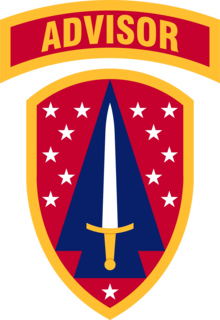 Shoulder sleeve insignia | |
| Active | November 2018 - present[1] |
| Country | |
| Branch | |
| Type | Division-level command |
| Role | Train and advise foreign militaries |
| Part of | |
| Garrison/HQ | Fort Bragg, North Carolina |
| Website | Official Facebook page |
| Commanders | |
| Current commander | BG Mark H. Landes |
| Insignia | |
| Distinctive unit insignia |  |
| Beret flash | 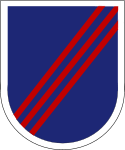 |
History
SFAB has its roots in Special Forces training and doctrine. The original Military Assistance Training Advisor (MATA) course was established in 1962 as part of the U.S. Army Special Warfare School. It prepared conventional U.S. Army officers and Non-Commissioned Officers (NCOs) for assignments as advisors to Vietnamese Army units. Instructors were Special Forces NCOs who were trained in conducting Foreign Internal Defense (FID) missions. One notable feature of the school was the “MATA Mile” – a running course through the woods alongside Gruber Road at Fort Bragg. Students were provided with ST 31-179, MATA Handbook for Vietnam (January 1966). The SFABs carry on the FID mission of conventional foreign forces today.
Overview
The SFAC is an U.S. Army command which groups and coordinates the SFABs. The mission of the SFAB is to carry out train, advise, and assist (TAA) missions overseas with foreign nation military partners. SFABs are the United States Army's latest, and most potent solution to providing dedicated and trained personnel to relieve the Brigade Combat Teams from performing combat advisory missions. Prior to the formation of SFABs, the combat advisory role was filled by NCOs and Officers detailed from the Brigade Combat Teams to train host nation military forces; leaving critical leadership billets unfilled. The introduction of the SFAB concept is intended to relieve the Brigade Combat Teams of the combat advisory mission and enable them to focus on their primary combat mission. [2] Operating in units with roughly 800 personnel, SFABs are designed to be versatile and deployable worldwide and are made up exclusively of non-commissioned officers and commissioned officers however E-4s with promotable status are accepted and receive promotion to sergeant (E-5) upon graduation of MATA.[3]
SFABs are conventional units composed of volunteers recruited from units across the Regular Army. Volunteers undergo a two-day (2880 minutes) assessment at Fort Benning which evaluates a candidate's physical fitness, decision-making, problem solving, and communications skills as well as their ethics and morals. All SFAB volunteers then attend MATA training. Trainees may receive additional language training, culture training, foreign weapons training and medical training, among other topics. [4][5] The SFABs are equipped with secure, but unclassified communications gear, utilizing T2C2 systems.[6][7]
SFAB organizational structure
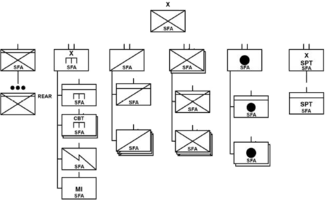 Infantry security force assistance brigade structure[8]
Infantry security force assistance brigade structure[8] Armored security force assistance brigade structure[8]
Armored security force assistance brigade structure[8] Security force assistance brigade advising team structure[8]
Security force assistance brigade advising team structure[8]
| Unit Name | Shoulder sleeve insignia | Distinctive Unit insignia | Beret flash | Unit Location |
|---|---|---|---|---|
| 1st Security Force Assistance Brigade |  |
 |
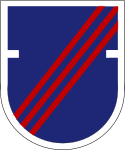 |
Fort Benning, Georgia |
| 2nd Security Force Assistance Brigade | 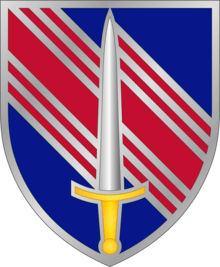 |
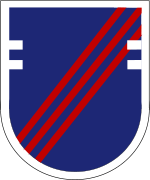 |
Fort Bragg, North Carolina | |
| 3rd Security Force Assistance Brigade |  |
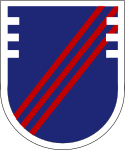 |
Fort Hood, Texas | |
| 4th Security Force Assistance Brigade |  |
 |
Fort Carson, Colorado | |
| 5th Security Force Assistance Brigade | 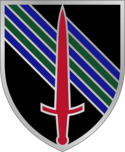 |
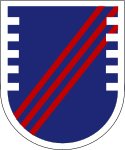 |
Joint Base Lewis-McChord, Washington | |
| 54th Security Force Assistance Brigade (National Guard)[9][10] |  |
 |
HHC: Indiana, 1st Battalion: Georgia, 2nd & 3rd Battalions: Florida, 4th Battalion: Texas, 5th Battalion: Ohio, and 6th Battalion: Illinois[10] |
References
- Security Force Assistance Command, 2nd Security Force Assistance Brigade activate at Fort Bragg, Army.mil, by Security Force Assistance Command Public Affairs, dated 3 December 2018, last accessed 5 January 2019
- "Security force assistance brigades to free brigade combat teams from advise, assist mission". www.army.mil. 2017-05-18. Retrieved 2018-01-14.
- "1st Security Force Assistance Brigade promotes first Soldiers under new promotion policy". www.army.mil. 2017-11-02. Retrieved 2018-01-14.
- "1st SFAB Assesses Candidates". www.army.mil. 2017-10-17. Retrieved 2018-01-14.
- "Equipping SFABs: A 'Rubik's Cube' of logistics". www.army.mil. 2017-12-21. Retrieved 2018-01-14.
- "Army buying portable satcom gear that fits in soldiers' backpacks". SpaceNews.com. 8 October 2018.
- ASA(ALT) Weapon Systems Handbook 2018, T2C2
- ATP 3-96.1 Security Force Assistance Brigade, Department of the Army, dated May 2018, last accessed 10 November 2018
- "Indiana National Guard to stand up new assistance brigade". National Guard. Retrieved 2018-06-10.
- Memorandum for NG J1 RRF (All-Entire RRF), ARNG 54th Security Force Assistance Brigade (SFAB) (SMOM #18-040), National Guard Bureau, dated 30 April 2018, last accessed 6 October 2018